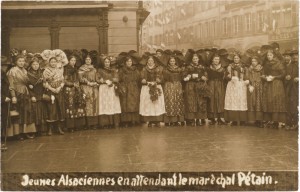 |
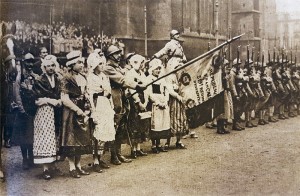 |
Alsatians of all ages dressed in traditional garb pose for a photographer waiting for Pétain, just made Marshal, in Metz on 8 December 1918.
Some young Lorraines, also in traditional wear, frame the flag holder of a regiment waiting for the President of the Republic, Poincaré and the President of the Council, Clemenceau
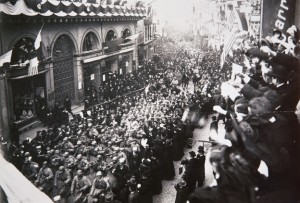 Troops entering Mulhouse, 17 November 1918. The streets were decked with flags, the crowd had flooded into the Streets
Troops entering Mulhouse, 17 November 1918. The streets were decked with flags, the crowd had flooded into the Streets
Poincaré bestowed a marshal’s staff on Pétain, with Joffre, Foch, Haig and Pershing looking on. The staff can be found in 1914-1918 Rooms of the Musée de l’Armée
December, 1918, Georges Clemenceau and Alexandre Millerand in Alsace
Reintegrated territories
Germans for 47 years
Alsace, except the Belfort district, and Lorraine had been annexed by the German Empire on 14 August 1870. Article 2 of the Treaty of Frankfurt (10 May 1871) provided that Alsatians-Lorrains could choose French nationality up to 31 October 1872, but would in that event be obliged to leave the country. After that time, they would become Germans.
During the Great War, approximately 250,000 Alsatians-Lorrains were mobilised in the German army. They served mainly on the Eastern Front. The law of 5 August 1914 allowed some Alsatians-Lorrains to gain French nationality by signing an act of engagement in the armed forces for the duration of the war. The majority of them were sent to North Africa and the overseas territories, some becoming workers in the weapons factories. Those who chose to fight on the Western Front often took on an assumed name to avoid retaliation. The situation is also complex for civilians, sometimes interned in German or French camps on the suspicion that they were too Francophile or Germanophile.
Alsace-Lorraine, French at all costs
From February 1915, a committee was tasked with looking into all the administrative, religious and school problems that would arise were Alsace-Lorraine to be reattached to France. On 6 October 1918, it was decided that the “Recovered Provinces” would be occupied by French troops in the same way as the liberated French departments.
Autumn 1918… Joy and uneasiness
On 17 November, the French army entered Mulhouse. The President of the Republic, Raymond Poincaré, born in Lorraine, and Clemenceau were hosted in Lorraine and Alsace from 8 to 10 December 1918. They bestowed the French Marshal’s Staff on Pétain on 8 December 1918 in Metz.
After the initial joy, unease arose when Clemenceau opted for rapid assimilation, without taking into account the specificities dear to these populations, or even their language, which was not French. Lorraine became the French department of Moselle, while Alsace, was divided into Upper Rhine and Lower Rhine. Around 110,000 German residents were evicted, while the problem of “mixed” families emerged. Again, the Alsatians and some of the Lorrains were asked to choose between the French and German nationalities. They were divided into four categories, each with a specific identity card.
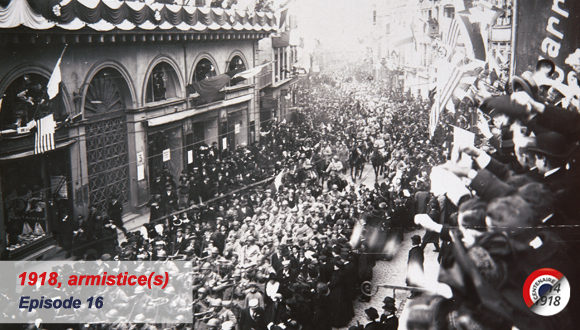
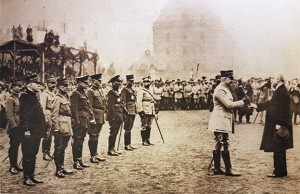
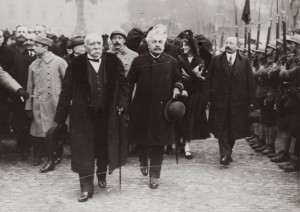

Ajouter un commentaire